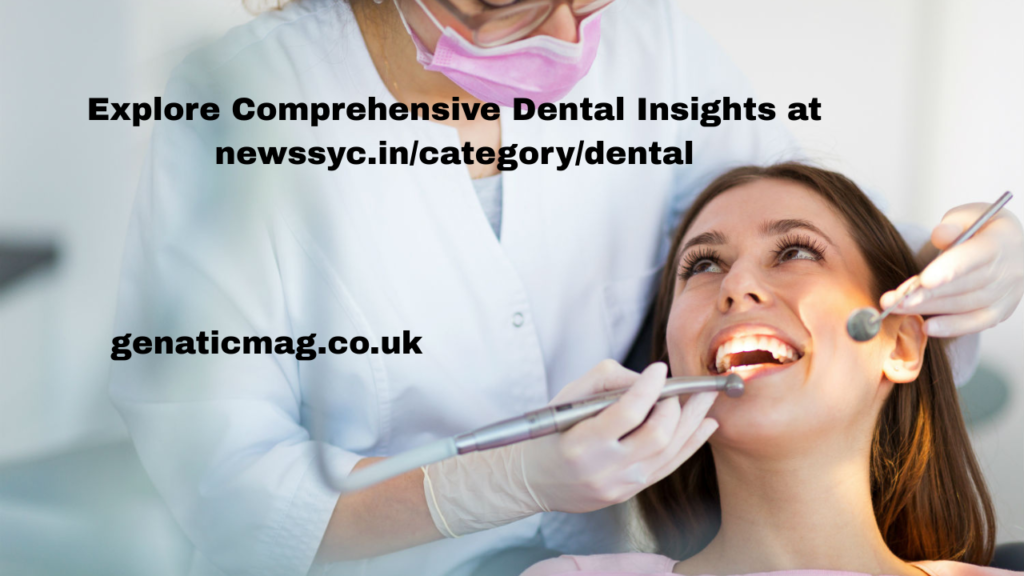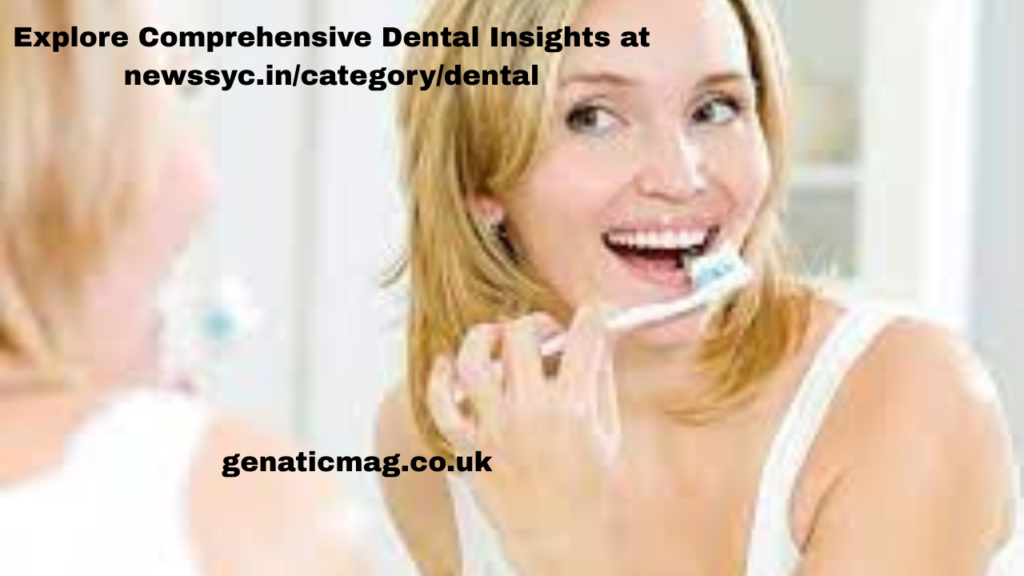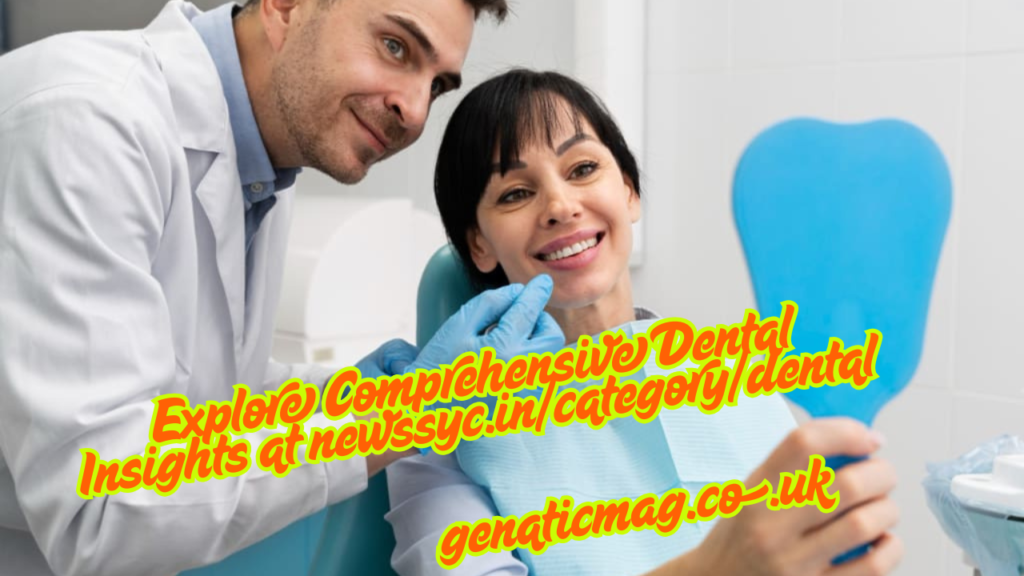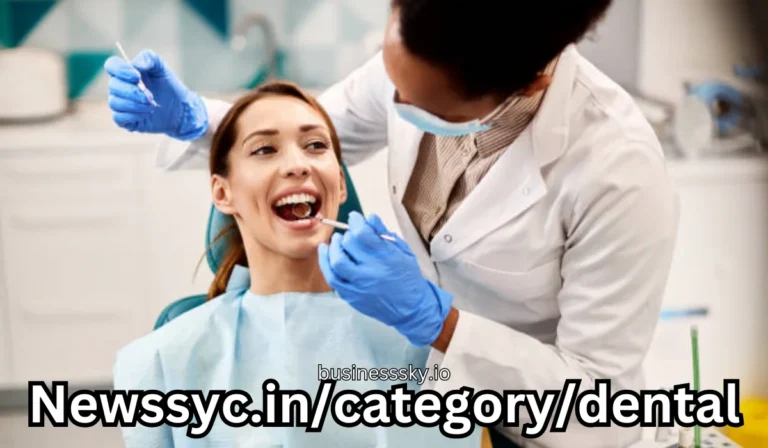When it comes to health, dental care often takes a backseat—but oral health is far more important than most people realize. The portal Explore Comprehensive Dental Insights at newssyc.in/category/dental offers an in-depth look into every essential aspect of dental well-being. Whether you’re seeking expert advice, understanding treatment options, or learning how to maintain a healthy smile, this platform offers a wide spectrum of trusted and practical dental knowledge.
Let’s delve into the extensive topics and detailed information covered under Explore Comprehensive Dental Insights at newssyc.in/category/dental, helping you make informed decisions for lifelong dental health.
1. Understanding the Basics of Dental Health

Dental care starts with knowing the basics. At Explore Comprehensive Dental Insights at newssyc.in/category/dental, you can find beginner-friendly guides that explain the fundamentals of oral hygiene. From how plaque forms to why flossing matters just as much as brushing, the site simplifies complex dental science.
These seminal articles also emphasize the link between general health and dental health. Diabetes, respiratory infections, and cardiovascular disease have all been connected to poor dental hygiene. Anyone who wants to get a solid foundation in oral health knowledge should read this category.
2. A Deep Dive into Common Dental Problems

Many people ignore minor oral discomforts until they escalate into serious problems. The section Explore Comprehensive Dental Insights at newssyc.in/category/dental breaks down frequent dental issues such as:
- Tooth decay and cavities
- Gingivitis and periodontitis
- Tooth sensitivity
- Oral infections and abscesses
- Bad breath (halitosis)
- TMJ disorders and jaw pain
Each topic is explored in detail with symptoms, causes, prevention tips, and when to seek professional help. The content is crafted not just for awareness, but also to help readers take proactive steps before things get worse.
3. Latest Advancements in Dental Treatments

Modern dentistry is not what it used to be. From laser dentistry to invisible aligners, innovation is shaping better outcomes with minimal discomfort. In the Explore Comprehensive Dental Insights at newssyc.in/category/dental section, readers will find detailed information on the newest treatments like:
- Dental implants
- Invisalign and clear aligners
- Same-day crowns
- Digital X-rays and 3D scanning
- Sedation dentistry
- Biocompatible dental materials
These articles help demystify high-tech dental procedures, providing clarity on what to expect and how to prepare. Whether you’re nervous about visiting a dentist or simply curious about modern methods, this section is your go-to guide.
4. Preventive Care: The Secret to Long-Lasting Oral Health
Prevention is always better than cure, and that mantra is especially true for dental health. The site Explore Comprehensive Dental Insights at newssyc.in/category/dental strongly emphasizes preventive care with practical, everyday strategies:
- How to pick the best toothpaste and toothbrush
- Dietary factors and dental health
- The value of routine dental examinations
- How to prevent bruxism, or teeth grinding
- Mouthguards for night grinders and sportsmen
These articles aim to empower readers to protect their teeth before any problem arises. Good habits built early can prevent years of discomfort and high treatment costs.
5. Pediatric Dental Care: For Healthy Smiles from the Start
Children require special care when it comes to dental hygiene. Explore Comprehensive Dental Insights at newssyc.in/category/dental dedicates content specifically for pediatric dental concerns. This includes:
- When is the right time to take your child to the dentist?
- How to handle baby tooth eruption and teething
- Preventing cavities in young children
- Teaching children how to brush
- Selecting items with or without fluoride
The site is a treasure trove for parents who want to ensure their kids grow up with healthy, strong teeth and a positive attitude toward dental care.
6. Cosmetic Dentistry: More Than Just a Pretty Smile
Cosmetic dentistry goes beyond aesthetics—it can also improve functionality, confidence, and even oral hygiene. The portal Explore Comprehensive Dental Insights at newssyc.in/category/dental features expert articles that explore treatments such as:
- Teeth whitening options (in-office and at-home)
- Dental veneers and bonding
- Smile makeovers
- Gum contouring
- Orthodontics for adults
These resources can help you evaluate cosmetic procedures, understand costs, and weigh pros and cons with confidence.
7. Dental Myths vs. Facts – Setting the Record Straight
Misinformation can be dangerous, especially in healthcare. That’s why Explore Comprehensive Dental Insights at newssyc.in/category/dental has an entire section dedicated to busting myths and clarifying misconceptions. Here are a few tackled by the site:
- “Sugar is the only cause of cavities”
- “If my teeth don’t hurt, they’re healthy”
- “Whitening damages your enamel”
- “Braces are only for children”
By separating fact from fiction, these articles help readers make smarter decisions and avoid harmful habits rooted in outdated beliefs.
8. Senior Dental Care: Aging Gracefully with Healthy Teeth
As we age, our dental needs evolve. Explore Comprehensive Dental Insights at newssyc.in/category/dental gives special attention to senior oral care topics like:
- Managing dry mouth
- Dealing with tooth loss and dentures
- Treating gum recession
- Monitoring oral signs of other diseases
- Maintaining nutrition for healthy teeth
This section serves as a valuable guide for elderly readers and caregivers looking to support dental wellness throughout life’s later stages.
9. Psychological and Social Aspects of Dental Health
Oral health is closely tied to self-esteem, communication, and mental well-being. The category Explore Comprehensive Dental Insights at newssyc.in/category/dental explores deeper dimensions of dental care, such as:
- Overcoming dental anxiety and phobia
- How smiles impact social interactions
- Dealing with embarrassment due to bad breath or missing teeth
- The link between oral health and confidence at work or school
These thoughtful articles remind readers that a healthy smile isn’t just about appearance—it’s about feeling good and living confidently.
Conclusion: Why You Should Explore Comprehensive Dental Insights at newssyc.in/category/dental
In a world filled with endless information, having a centralized, reliable source for dental knowledge is invaluable. Explore Comprehensive Dental Insights at newssyc.in/category/dental stands out as a robust hub for everyone—from everyday individuals and parents to professionals and the elderly—offering clear, trusted, and actionable guidance on all aspects of dental health.
Whether you’re looking to solve a problem, learn something new, or just stay informed, this resource will guide you every step of the way toward achieving and maintaining a bright, healthy smile for life.
So don’t wait—Explore Comprehensive Dental Insights at newssyc.in/category/dental and take the first step to transform your oral health today.
Also Read : Explore Comprehensive Dental Insights at newssyc.in/category/dental
